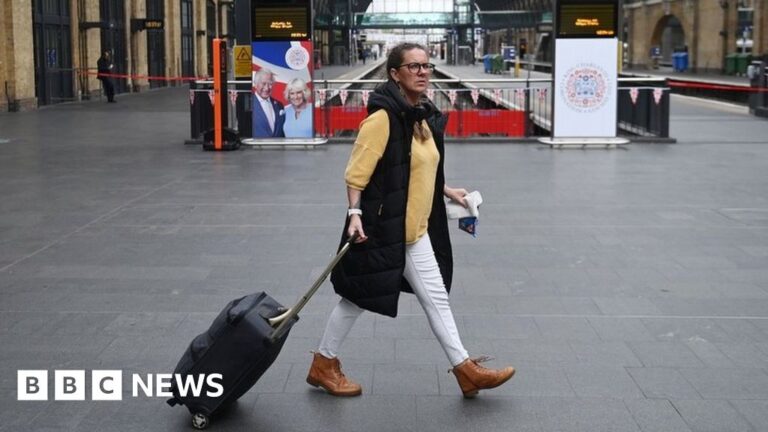RMT general secretary Mick Lynch (third from right) joins members of his union on Saturday outside Euston station
Rail passengers face travel disruption on the day of the Eurovision Song Contest final as members of the RMT union strike again in a long-running dispute over pay and conditions.
Fourteen train companies are affected, many of which operate limited services.
Transport Secretary Mark Harper said the strikes were “cynically targeting” the final, which takes place in Liverpool on Saturday night.
But the RMT denied planning strikes to coincide with the event.
It said Saturday was chosen for a strike because it was the last date allowed under labor laws.
Its general secretary Mick Lynch said he was sorry for the inconvenience but added that people had had “plenty of time” to make alternative travel arrangements, with the union giving more than two weeks’ notice.
The government said the RMT had rejected a “fair and reasonable” pay offer, but the union denied this.
Train drivers who are part of another union, Aslef, went on strike on Friday, with parts of England without trains all day. It also denies planning strikes to affect Eurovision.
Merseyrail, which runs trains around Liverpool, said it was unaffected by Saturday’s strikes and would run evening services.
But most train companies traveling to and from Liverpool have limited services as a result of strike action, according to National Rail.
National Express says it has added 33 extra services to Liverpool to help fans get to Eurovision.
Train companies are warning There will be “little or no service” in large areas of the network and said passengers should be prepared for disruption in the days immediately following the strikes.
Speaking on a picket line outside London Euston station, Mr Lynch said today was the last Saturday of the union’s six-month mandate in which it could strike.
He then told BBC Radio 4’s Today Programme: “We didn’t target Wembley or Liverpool or any of the activities people do” – a reference to both Eurovision and the National League football play-off final at Wembley on Saturday afternoon.
“There is not a day in which people do not carry out important activities, in business life or personal life.
“We don’t set the Eurovision date. We don’t set anti-trade union laws that require us to have a mandate that expires after six months.”
He said the union “will not be targeting a cup final”, but did not rule out strikes taking place on June 3, when the men’s FA Cup Final will be played.
Future strike dates could be announced as early as next week, he said, adding that the union was available to meet with the government and employers at any time to try to agree a deal.
He wrote to the transport secretary calling for a special summit between ministers, rail companies and unions to end the unrest on the railways.
Which lines are affected?
The following train operators will be affected:
Avanti West Coastc2c, Chiltern RailwaysCrossCountry, East Midlands RailwayGatwick Express, Great NorthernGWR, Greater Anglia (including Stansted Express)Heathrow Express, LNERLondon Northwestern Railway, NorthSouth Western Railway, SoutheastSouth, ThameslinkTransPennine Express, and West Midlands Railway.
The Rail Delivery Group (RDG), which represents 14 rail companies, said rail users should plan ahead and check services before travelling. It warned that with fewer services running there would be “wide variation”.
Rebecca Dane-Alderman is planning to travel from Milton Keynes to Worthing to watch the Eurovision final with her best friend – a tradition they share every year, except during the coronavirus pandemic.
He said most of Friday was spent trying to find alternative routes, but they were unsuccessful, so instead watched it in separate locations via a video call.
He told BBC Radio 4’s Today Programme: “Most of yesterday I was a bit sad and I felt very devastated by it all.
“I know there are bigger problems in the world, but this is something that, like I said is a tradition with us, and we really look forward to doing.
“I really hope there is some sort of resolution soon… Because it impacts people in a multitude of ways and less obvious ways than people can imagine.”
RDG has offered railway workers a backdated salary hike of 5% for 2022.
The wage increase in the second year depends on the reforms being discussed.
Mr Harper called on the RMT to allow its members to have a vote on the offer put forward by the RDG.
But Mr Lynch said the RDG had “torpedoed” talks aimed at ending the long-running dispute because the agreement banned further industrial action.
He told BBC Breakfast: “We don’t have enough people, and our members, and Aslef members, have to work extended shifts, extra days, six and seven days out of the week, when they sick and tired here..
“They should be able to earn a living within the working week that is in their contract.”
Meanwhile, train drivers with Aslef rejected a two-year offer in which members would have received a backdated wage increase of 4% for 2022 and a 4% increase this year.
However, there was some resolution between the rail industry and the unions. A revised offer from Network Rail, which owns and operates the UK’s railway infrastructure, was accepted by RMT members on 20 March, ending a separate dispute.
Aslef drivers will strike again on May 31 and June 3, the day of the FA Cup final.
How is the latest round of rail strikes affecting you? Share your experiences by emailing haveyoursay@bbc.co.uk.
Please include a contact number if you are willing to speak to a BBC journalist. You can also get in touch in the following ways:
If you’re reading this page and can’t see the form you’ll need to visit the mobile version of the BBC website to submit your question or comment or you can email us at HaveYourSay@bbc.co.uk. Please include your name, age and location in any submission.
